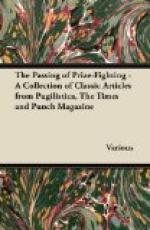Victory Over Blindness (HODDER AND STOUGHTON) is a book whose title gives you at once the key to its contents and to the spirit that animates them. It is the record by Sir ARTHUR PEARSON of one of the most finely successful enterprises that the War has called forth. Everyone to-day has at least a vague idea of the work carried on at St. Dunstan’s, “the biggest individual business,” Sir ARTHUR terms it, “that I have ever conducted.” A study of these pages will transform that vague idea into wonder and admiration. Big the business might well be called, since it is nothing less than the bringing back, almost to normal life, of men apparently condemned to an existence of helpless inactivity and dependence. Few things will strike you more forcibly in this book than its practical common sense. That and an unsentimental optimism seem to be the dominant notes of all Sir ARTHUR’S effort. Without doubt the success of this has been beyond measure helped by the fact that the originator was himself a sharer in the adversity that it was designed to lessen. Two chapters especially in the book, called “Learning to be Blind,” a brief manual of practical suggestions by one whom experience has rendered expert, supply a clue to the difference between the work at St. Dunstan’s and the best-intentioned efforts of outside sympathy, Victory Over Blindness is a proud and rewarding motto; this little volume will show how thoroughly it has been earned.
* * * * *
I fancy that Miss JOAN THOMPSON had some design of symbolism in the choice of a name for her heroine, Mary England (METHUEN). The publishers indeed consider that she might be called “Every Woman,” so typical is she of her sex, and “so like to the emotional careers of so many English girls is her own.” Perhaps, on the other hand (without disparagement to the skill of Miss THOMPSON’S portraiture), I should have expected the typical maiden of Mary’s class to show greater initiative. Many things nearly happened to Mary; practically nothing in her life was fashioned by her own intent. Of the two men who might have made her happy, one didn’t propose at all, and one did it in the wrong fashion. Other two, who seemed possibly menacing, both drifted away with their evil purpose (if any) unfulfilled. I am wrong, though, in recalling Mary as invariably passive. She was once roused to the action of destroying the manuscript of a novel, in which the writer, the man who didn’t propose, had too faithfully revealed his perception of herself. But though, as a reviewer, I may applaud this achievement on general grounds, it provided no kind of solution for the problem of her existence. This was left to be settled, very much offhand, by a detached iceberg, which sank the ship in which Mary was emigrating. I thought that iceberg rather an evasion on the part of Miss THOMPSON. Perhaps however all this effect of drift is part of a subtle intention. I can certainly call the book admirably written, with restraint and an emotional sympathy that impressed me as the outcome probably of an intimate knowledge of the scenes and persons described. Whether her lethargy is “typical” or not, as a study Mary England will hold you at least sufficiently curious to deplore its arbitrary end.




